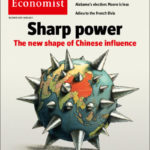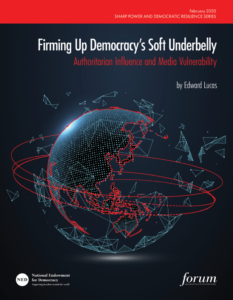China launches counteroffensive in the war of ideas
 For China’s one party-state, the West’s promotion of liberal democracy is part of an ideological struggle led by an adversary that is still vastly superior, a situation that Chinese strategists describe as xiqiang woruo (“the West is strong, while China is weak”). The hostile forces are liberal democratic ideals and their corollaries – constitutional democracy, universal values, individual rights, economic liberalism, free media – which have been identified by the CCP as deadly “perils,” says analyst Nadege Rolland.
For China’s one party-state, the West’s promotion of liberal democracy is part of an ideological struggle led by an adversary that is still vastly superior, a situation that Chinese strategists describe as xiqiang woruo (“the West is strong, while China is weak”). The hostile forces are liberal democratic ideals and their corollaries – constitutional democracy, universal values, individual rights, economic liberalism, free media – which have been identified by the CCP as deadly “perils,” says analyst Nadege Rolland.
In the battle for influence, the power discrepancy is not so much technological as it is about an imbalance in “discourse power”. In China’s evolving strategic lexicon, this term refers to the ability not only to articulate attractive ideas, but also to be listened to, to influence others’ perceptions, and eventually to shape the international conversation [employing what the National Endowment for Democracy [NED] calls ‘sharp power‘], she writes for the Lowy Institute’s The Interpreter:
 Beijing believes the West has used its power in this domain to dominate the international system and the world order. Words are not merely instruments of communication used to facilitate exchanges and discussions; they convey concepts, ideals, and values that are the foundation for the norms on which the international architecture is constructed and thus determine how the world order is run. In sum: Whoever rules the words rules the world. In the eyes of the CCP, the West’s superior discourse power is an existential threat more imminent than the remote possibility of a foreign military invasion. RTWT
Beijing believes the West has used its power in this domain to dominate the international system and the world order. Words are not merely instruments of communication used to facilitate exchanges and discussions; they convey concepts, ideals, and values that are the foundation for the norms on which the international architecture is constructed and thus determine how the world order is run. In sum: Whoever rules the words rules the world. In the eyes of the CCP, the West’s superior discourse power is an existential threat more imminent than the remote possibility of a foreign military invasion. RTWT
As Russia and China’s sharp power push continues to gnaw away at our societies, institutions, and alliances, Western responses are often defeatist, notes CEPA’s Edward Lucas who encountered this at the Munich Security Conference in mid-February when he presented a report – Firming up Democracy’s Soft Underbelly: Authoritarian Influence and Media Vulnerability[PDF].
 “I had some specific practical ideas about how to protect our information system. But many people in the audience thought I was aiming too low. The real, essential issue was surely regulating Facebook? My response is that we need to do both,” he writes:
“I had some specific practical ideas about how to protect our information system. But many people in the audience thought I was aiming too low. The real, essential issue was surely regulating Facebook? My response is that we need to do both,” he writes:
We certainly need big-picture, high-level responses. They come slowly, but even talking about them has a deterrent effect. We also need to take specific steps wherever we can, even at the most micro-level. For example, highlighting information attacks whenever they occur alerts other people and helps make these stunts less effective next time. Setting benchmarks for good practice gives others examples to copy.
Russia’s leader, Vladimir Putin, a former KGB officer, has reconstituted and updated the KGB’s old Cold War playbook for the new digital age, analyst writes in Spies, Election Meddling, and Disinformation: Past and Present, an article for the Brown Journal of World Affairs. His paper, an exercise of applied history, has two aims: first, to understand the history of Soviet disinformation, and second, to make sense of Western efforts to counter it during the Cold War. Doing so provides policy-relevant conclusions from history about countering disinformation produced by Russia and other authoritarian regimes today.
Nenhum comentário:
Postar um comentário
Comentários são sempre bem-vindos, desde que se refiram ao objeto mesmo da postagem, de preferência identificados. Propagandas ou mensagens agressivas serão sumariamente eliminadas. Outras questões podem ser encaminhadas através de meu site (www.pralmeida.org). Formule seus comentários em linguagem concisa, objetiva, em um Português aceitável para os padrões da língua coloquial.
A confirmação manual dos comentários é necessária, tendo em vista o grande número de junks e spams recebidos.